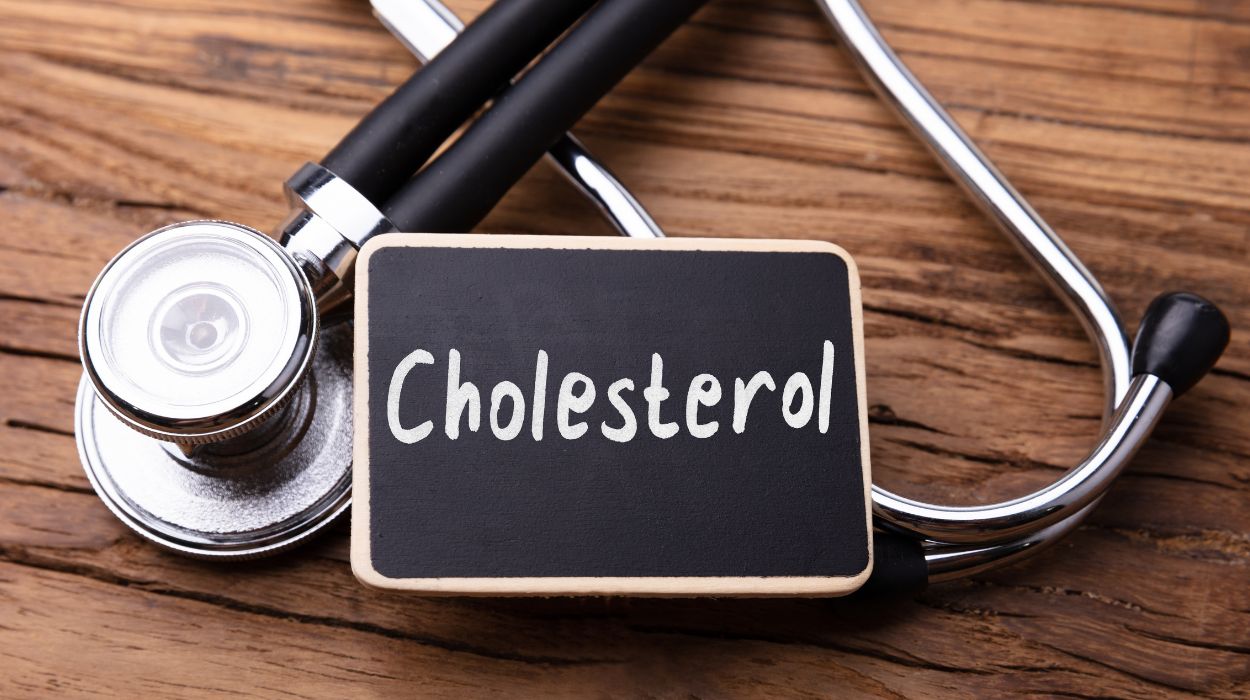 Evidence Based
Evidence Based
Evidence Based
This article is objectively based on relevant scientific literature, written by experienced medical writers, and fact-checked by a team of degreed medical experts.
Our team of registered dietitian nutritionists and licensed medical professionals seek to remain objective and unbiased while preserving the integrity of any scientific debate.
The articles contain evidence-based references from approved scientific sites. The numbers* in parentheses (*1,2,3) will take you to clickable links to our reputable sources.
Keto And Cholesterol: How Does Keto Affect Cholesterol?

The ketogenic diet has gained recent popularity for its weight loss benefits. This strict low-carb, high-fat diet completely changes the composition of the daily dietary intake and switches the main energy source from carbohydrates to fats through a process called ketosis, which can alter other parameters in the body, such as cholesterol levels. Understanding the relationship between the keto diet and cholesterol is essential for assessing its overall impact on cardiovascular health.
Cholesterol plays an important role in heart health, and lowering cholesterol levels has been linked with decreased risk of heart disease. Depending on the individual, the keto diet either improves cholesterol levels or lead to dangerously high levels of cholesterol for others.
This is because cholesterol levels depend not only on diet, but also on other factors such as genes, metabolic diseases, and body composition.
In this article, we will explore the keto diet, how we measure cholesterol, and the ketogenic diet’s impact on cholesterol in a multitude of populations. We’ll also discuss tips to keep in mind to keep cholesterol low while embarking on the ketogenic diet.
Keto And Cholesterol: How Does Keto Affect Cholesterol?
The keto diet and its link to high cholesterol have been a question of concern. Still, the keto diet has been shown to lower cholesterol levels in specific populations, particularly those with diabetes and obesity. On the other hand, the ketogenic diet can raise cholesterol levels in healthy individuals and those with specific genetic variants that alter cholesterol metabolism. It is essential to consult with your doctor or nutritionist before undertaking a drastic dietary change like the keto diet.

The Way Keto Diet Affects Cholesterol: Detailed Information
Keto Diet In Diabetes
There has been a growing body of research on the impact of the ketogenic diet on the lipid profile of patients with diabetes because this population is at a higher risk of dyslipidemia and cardiovascular disease.
A study[1] on type II diabetics, found the keto diet reduced triglycerides and total cholesterol and increased HDL levels, which would improve dyslipidemia status. An additional meta-analysis[2] of studies assessing the impact of the ketogenic diet on diabetes found similar results, with most studies demonstrating decreased triglycerides, total cholesterol, and LDL cholesterol levels and increases in HDL cholesterol levels. Additionally, research has shown that the ketogenic diet leads to weight loss, reduced blood sugar spikes[3], improved glycemic control, and reduced HgA1c in patients with type II diabetes.
Overall, the ketogenic diet is a promising adjunctive therapy for patients with diabetes, providing improvements in weight control, glycemic control, and lipid metabolism.
Ketogenic Diet Vs. Low-Calorie
The ketogenic diet has been shown to have promising lipid-lowering effects in specific populations compared with low-calorie diets. In a study[4] comparing the keto diet to a low-calorie diet in diabetic patients, triglyceride levels significantly decreased. If you have elevated triglycerides, taking on a ketogenic diet under the supervision of a healthcare provider may assist in lowering these levels.
Ketogenic Diet In Obese Populations
Research has shown that obese populations with lipid issues can benefit from the ketogenic diet. One study[5] on the long-term effects found that it significantly reduced the body weight and body mass index, decreased the level of triglycerides, LDL cholesterol, and blood glucose, and increased HDL cholesterol. These promising results have been repeated in other studies[6] as well. Overall, the benefits of the ketogenic diet in obese patients show favorable results.
Ketogenic Diet In Healthy Population
There has been conflicting evidence on the role of the ketogenic diet on cholesterol levels in healthy populations. A recent meta-analysis[7] of normal weight adults found the ketogenic diet significantly increased total cholesterol, LDL, and HDL. Although there was an increase in the “good” cholesterol in these studies, raising LDL[8] and total cholesterol levels in healthy people can lead to cardiovascular disease, so it might not be the right diet for you if you fall in this category.
The Way Keto Diet May Change LDL Cholesterol
LDL cholesterol levels in the blood significantly contribute to the increased risk of atherosclerotic lesion formation[9], which causes cardiovascular disease, so it is essential to assess the impact of ketogenic diets on this lipid. LDL becomes elevated[10] due to overconsumption[11] of saturated fats, including fatty meats like bacon and sausage and dairy products like butter, milk, and cheese. Unfortunately, because the ketogenic diet is high in fats, keto dieters can consume elevated levels of saturated fats, which can unknowingly raise their LDL levels.
Not all keto dieters eat the ketogenic diet the same way, which leads to conflicting study results.. Some research has suggested the keto diet can lower[12] LDL levels, other studies demonstrated increases[13] in LDL, particularly in young, healthy women[14], and others showed no change[15].
The most important thing to lower your LDL level is limiting your saturated fat intake. If you switch to a diet filled with unsaturated fats, you may be able to lower your LDL level while on the ketogenic diet.
What Is The Keto Diet?
The ketogenic diet is a high-fat, low-carbohydrate, and moderate-protein dietary approach. It has gained popularity recently for its reported weight loss and health benefits[16].
The keto diet[17] includes no more than 10% of its calories from carbohydrates, around 20% from protein, and 70% from healthy fats. When the body is deprived of carbohydrates, it switches to ketosis where it burns fat for fuel instead of carbohydrates.
Ketosis leads to the production of ketone bodies derived from fatty acids and can be used as an alternative energy source for the body and brain. The primary goal of a ketogenic diet is to achieve and maintain a state of nutritional ketosis, which has been shown to result in lower blood glucose levels, higher ketone body levels, and improved glycemic control[18].
The ketogenic diet has conflicting evidence behind its impact on cholesterol levels, and we’ll further explore its role here. We’ll also look into the research on the impact of the keto diet and high cholesterol.
What Is Cholesterol?
Cholesterol[19] is a fatty substance found in animal-based food products and produced naturally in our bodies. It is necessary for healthy cell functions but can also harm the body if it reaches abnormal blood concentrations.
Cholesterol is transported through the bloodstream by lipoproteins, such as high-density lipoprotein (HDL) and low-density lipoprotein (LDL). LDL cholesterol is often called “bad” cholesterol because high levels can lead to plaque accumulation, increasing the risk of heart disease. HDL cholesterol, on the other hand, is considered “good” cholesterol as it helps remove LDL cholesterol from the bloodstream, reducing the risk of cardiovascular issues.
3 Ways To Reduce Your LDL Cholesterol On A Keto Diet
Eat Keto-friendly Foods That Help Reduce LDL
There are many keto-friendly foods that can help reduce LDL levels. This includes:
- Nuts and seeds: walnuts, cashews
- Green vegetables: leafy greens
- Plant oils: olive oils, canola oils
- Spices: garlic, cayenne
Cashews and walnuts are particularly good for your health for various reasons, such as reducing inflammation[20] and aiding in weight loss[21]. Olive oil has many health benefits, such as supporting intestinal health and reducing inflammation[22]. Also, if you want to know how to get more leafy greens in your diet, check out this informative guide.
Garlic may also contribute to lowering high blood pressure[23], which is a common comorbidity[24] for people with high cholesterol. Here are some of the best garlic supplements that can help supplement your diet.
Try Not To Add Fat To Your Coffee
Adding whole milk or cream to your coffee is a source of saturated fat. Saturated[25] fat can cause elevated cholesterol, so replacing this morning ritual with a healthier alternative, such as almond milk or drinking it black, can help lower LDL levels.
Replace Saturated With Monounsaturated Fat
The ketogenic diet is a high-fat diet, which can lead to overindulgence of saturated fats. Saturated[26] fat consumption leads to elevated cholesterol levels. To reduce cholesterol levels, replacing saturated fats with monounsaturated fats such as olives, avocados, and nuts is best.
Keto May Be Harmful To Individuals Who Have Genetic Mutation
Your cholesterol levels can skyrocket from the ketogenic diet if you have specific inherited genetic mutations that impact LDL regulation. These genetic defects lead to increased LDL levels in the blood. This includes more common alterations[27] in genes such as APOB and APOE and rare alterations such as ARH, LDLR, MTP, NPC1L1, and PCSK9. Common names for these alterations include familial hypercholesterolemia and hypobetalipoproteinemia.
It is important to complete a lipid panel before initiating any drastic dietary changes like the ketogenic diet, as many people are unaware they have these potentially harmful genetic variants. Elevated blood levels of specific lipids will help your doctor make a correct diagnosis and adequately guide your diet.
Conclusion
The relationship between the keto diet and cholesterol levels is complex and multifaceted. While the keto diet has been associated with improving lipid profiles for some individuals, it is essential to consider individual variability, diet composition, and overall diet quality. Consulting with healthcare professionals and regularly monitoring cholesterol levels can help individuals make informed decisions about the keto diet and its potential impact on their health. By prioritizing healthy fats and maintaining an overall balanced diet, individuals can optimize their cholesterol levels while reaping the potential benefits of the keto diet.
Remember, each person’s response to the keto diet is unique, and it is essential to personalize the approach to ensure long-term success and overall well-being.
Frequently Asked Questions
Research has shown that the keto diet may be beneficial for lowering cholesterol in certain people with diabetes.
Eating keto-friendly foods that lower LDL, avoiding saturated fats, and not adding whole milk or creamer to your coffee are a few tips to lower your LDL.
If you have a genetic predisposition that impacts your ability to process LDL cholesterol, the ketogenic diet might cause cholesterol levels to skyrocket. Additionally, if you are consuming foods high in saturated fat you may contribute to elevated cholesterol levels. It is always best to check with your doctor before starting the keto diet so they can assess what would be safe for you.
+ 27 sources
Health Canal avoids using tertiary references. We have strict sourcing guidelines and rely on peer-reviewed studies, academic researches from medical associations and institutions. To ensure the accuracy of articles in Health Canal, you can read more about the editorial process here
- Hussain, T., Mathew, T.C., Dashti, A.A., Asfar, S., N.S. Al-Zaid and Dashti, H.M. (2012). Effect of low-calorie versus low-carbohydrate ketogenic diet in type 2 diabetes. [online] 28(10), pp.1016–1021. doi:https://doi.org/10.1016/j.nut.2012.01.016.
- Yuan, X., Wang, J.-D., Yang, S., Mei Hua Gao, Cao, L., Li, X., Hong, D., Tian, S. and Sun, C. (2020). Effect of the ketogenic diet on glycemic control, insulin resistance, and lipid metabolism in patients with T2DM: a systematic review and meta-analysis. [online] 10(1). doi:https://doi.org/10.1038/s41387-020-00142-z.
- Alarim, R.A., Alasmre, F.A., Alotaibi, H.A., Alshehri, M. and Hussain, S.J. (2020). Effects of the Ketogenic Diet on Glycemic Control in Diabetic Patients: Meta-Analysis of Clinical Trials. [online] doi:https://doi.org/10.7759/cureus.10796.
- Hussain, T., Mathew, T.C., Dashti, A.A., Asfar, S., Al-Zaid, N.S. and Dashti, H. (2012). Effect of low-calorie versus low-carbohydrate ketogenic diet in type 2 diabetes. [online] 28(10), pp.1016–1021. doi:https://doi.org/10.1016/j.nut.2012.01.016.
- Dashti (2021). Long-term effects of a ketogenic diet in obese patients. Experimental and clinical cardiology, [online] 9(3). Available at: https://pubmed.ncbi.nlm.nih.gov/19641727/
- Dashti, H.M., N.S. Al-Zaid, Mathew, T.C., Mahdi Al-Mousawi, Talib, H., Asfar, S. and Behbahani, A.I. (2006). Long Term Effects of Ketogenic Diet in Obese Subjects with High Cholesterol Level. [online] 286(1-2), pp.1–9. doi:https://doi.org/10.1007/s11010-005-9001-x.
- Joo, M., Moon, S., Young Seo Lee and Myeong Gyu Kim (2023). Effects of very low-carbohydrate ketogenic diets on lipid profiles in normal-weight (body mass index < 25 kg/m2) adults: a meta-analysis. [online] doi:https://doi.org/10.1093/nutrit/nuad017.
- Martin Bødtker Mortensen and Nordestgaard, B.G. (2020). Elevated LDL cholesterol and increased risk of myocardial infarction and atherosclerotic cardiovascular disease in individuals aged 70–100 years: a contemporary primary prevention cohort. [online] 396(10263), pp.1644–1652. doi:https://doi.org/10.1016/s0140-6736(20)32233-9.
- Huff, T., Boyd, B. and Ishwarlal Jialal (2023). Physiology, Cholesterol. [online] Nih.gov. Available at: https://www.ncbi.nlm.nih.gov/books/NBK470561/
- NHLBI, NIH. (2022). Causes and Risk Factors. [online] Available at: https://www.nhlbi.nih.gov/health/blood-cholesterol/causes
- Gershuni, V.M. (2018). Saturated Fat: Part of a Healthy Diet. [online] 7(3), pp.85–96. doi:https://doi.org/10.1007/s13668-018-0238-x.
- Kosinski, C. and Jornayvaz, F.R. (2017). Effects of Ketogenic Diets on Cardiovascular Risk Factors: Evidence from Animal and Human Studies. [online] 9(5), pp.517–517. doi:https://doi.org/10.3390/nu9050517.
- Larosa (2018). Effects of high-protein, low-carbohydrate dieting on plasma lipoproteins and body weight. Journal of the American Dietetic Association, [online] 77(3). Available at: https://pubmed.ncbi.nlm.nih.gov/7410754/
- Burén, J., Ericsson, M., Teixeira, R. and Sjödin, A. (2021). A Ketogenic Low-Carbohydrate High-Fat Diet Increases LDL Cholesterol in Healthy, Young, Normal-Weight Women: A Randomized Controlled Feeding Trial. [online] 13(3), pp.814–814. doi:https://doi.org/10.3390/nu13030814.
- Stern, L., Iqbal, N., Seshadri, P., Chicano, K.L., Daily, D.A., McGrory, J., Williams, M., Gracely, E.J. and Samaha, F.F. (2004). The Effects of Low-Carbohydrate versus Conventional Weight Loss Diets in Severely Obese Adults: One-Year Follow-up of a Randomized Trial. [online] 140(10), pp.778–778. doi:https://doi.org/10.7326/0003-4819-140-10-200405180-00007.
- Priya Sumithran and Proietto, J. (2008). Ketogenic diets for weight loss: A review of their principles, safety and efficacy. [online] 2(1), pp.1–13. doi:https://doi.org/10.1016/j.orcp.2007.11.003.
- Masood, W., Pavan Annamaraju and Uppaluri, K.R. (2022). Ketogenic Diet. [online] Nih.gov. Available at: https://www.ncbi.nlm.nih.gov/books/NBK499830/
- Jemal, M., Tewodros Shibabaw and Tadesse Asmamaw Dejenie (2021). Ketogenic Diets and their Therapeutic Potential on Breast Cancer: A Systemic Review. [online] Volume 13, pp.9147–9155. doi:https://doi.org/10.2147/cmar.s339970.
- Huff, T., Boyd, B. and Ishwarlal Jialal (2023). Physiology, Cholesterol. [online] Nih.gov. Available at: https://www.ncbi.nlm.nih.gov/books/NBK470561/
- Cordaro, M., Siracusa, R., Petrillo, A., D’Amico, R., Alessio Filippo Peritore, Enrico Gugliandolo, Genovese, T., Scuto, M., Crupi, R., Mandalari, G., Cuzzocrea, S., Rosanna Di Paola and Impellizzeri, D. (2020). Cashew (Anacardium occidentale L.) Nuts Counteract Oxidative Stress and Inflammation in an Acute Experimental Model of Carrageenan-Induced Paw Edema. [online] 9(8), pp.660–660. doi:https://doi.org/10.3390/antiox9080660.
- Rock, C.L., Flatt, S.W., Hava-Shoshana Barkai, Bilge Pakiz and Heath, D.D. (2017). Walnut consumption in a weight reduction intervention: effects on body weight, biological measures, blood pressure and satiety. [online] 16(1). doi:https://doi.org/10.1186/s12937-017-0304-z.
- Marcelino, G., Priscila Aiko Hiane, Karine, Lidiani Figueiredo Santana, Pott, A., Juliana Rodrigues Donadon and Rita (2019). Effects of Olive Oil and Its Minor Components on Cardiovascular Diseases, Inflammation, and Gut Microbiota. [online] 11(8), pp.1826–1826. doi:https://doi.org/10.3390/nu11081826.
- Ried, K. (2019). Garlic lowers blood pressure in hypertensive subjects, improves arterial stiffness and gut microbiota: A review and meta-analysis. [online] doi:https://doi.org/10.3892/etm.2019.8374.
- Schmieder, R.E. and Ruilope, L.M. (2008). Blood Pressure Control in Patients With Comorbidities. [online] 10(8), pp.624–631. doi:https://doi.org/10.1111/j.1751-7176.2008.08172.x.
- Gershuni, V.M. (2018). Saturated Fat: Part of a Healthy Diet. [online] 7(3), pp.85–96. doi:https://doi.org/10.1007/s13668-018-0238-x.
- Gershuni, V.M. (2018). Saturated Fat: Part of a Healthy Diet. [online] 7(3), pp.85–96. doi:https://doi.org/10.1007/s13668-018-0238-x.
- Burnett, J.R. and Hooper, A.J. (2008). Common and rare gene variants affecting plasma LDL cholesterol. The Clinical biochemist. Reviews, [online] 29(1), pp.11–26. Available at: https://www.ncbi.nlm.nih.gov/pmc/articles/PMC2423314/



